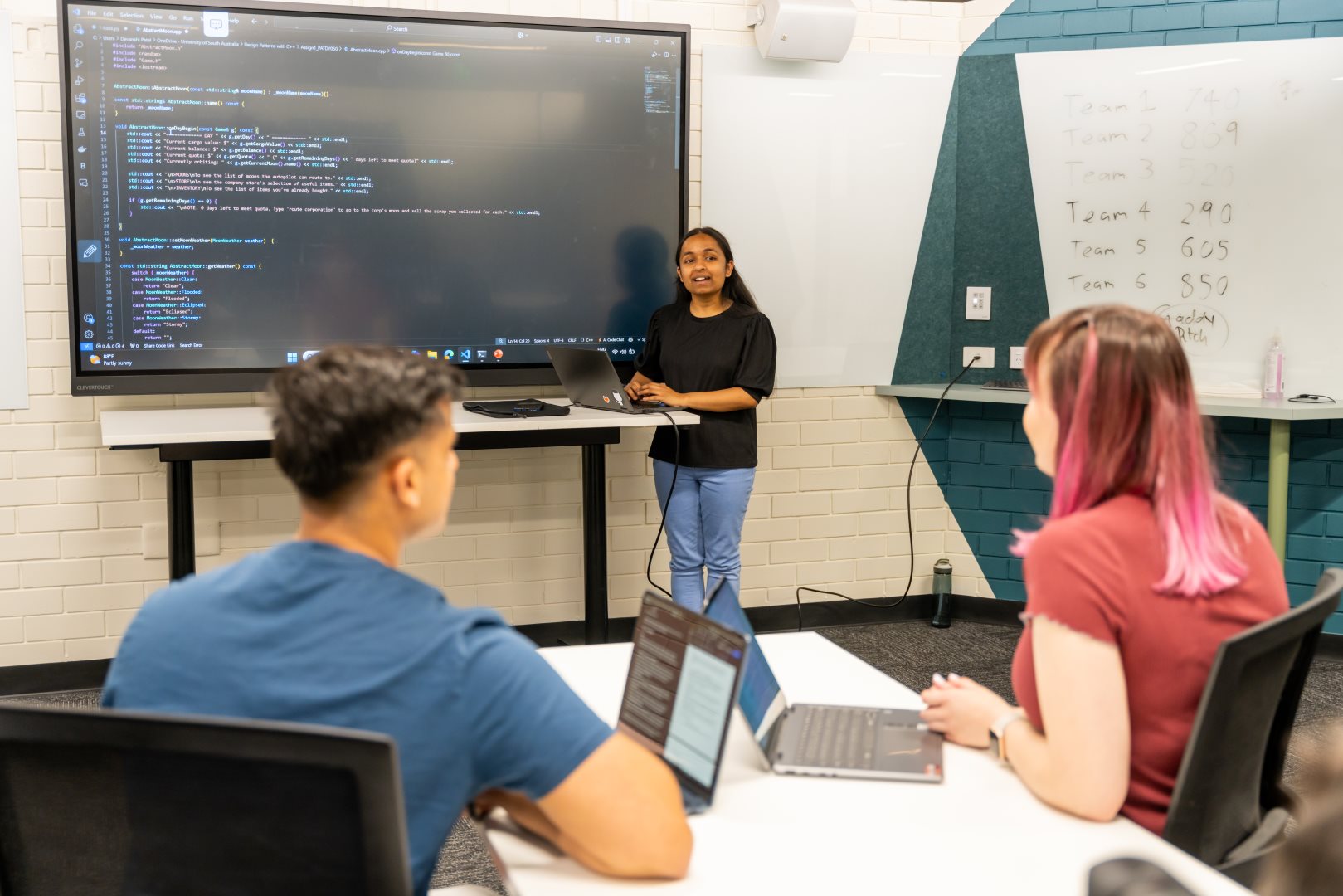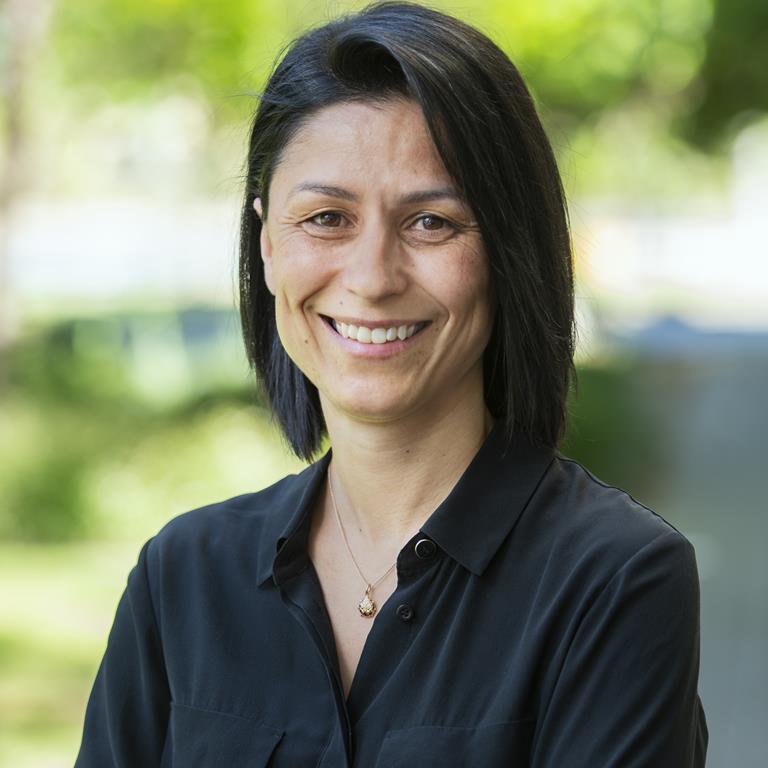Bachelor of Information Technology (Software Development)
Degree Level Undergraduate
Year 2025
You're considered an Australian student if you are any of the following:
Degree Level Undergraduate
Year 2025
Entry Scores
2025 Guaranteed Entry
Year 12 (ATAR-based): 66.00
Year 12 (Grades-based): B,B,B
TAFE/RTO: DIP
View Guaranteed Entry Info
2024 Cut-Offs
Year 12 (ATAR-based):
- Internal: 66.00
TAFE/RTO: Cert IV
View full entry requirements
The admission criteria have been grouped to assist you to easily find the information most relevant to your circumstances. However, you may fit into more than one and the university will consider applicants against each of the relevant criteria.
Certain conditions apply. For more information refer to Appendix 4 of the University's Selection and Entry policy.
Applicants are required to meet one of the following criteria with a competitive result, and demonstrate that they fulfil any prerequisite requirements and essential requirements for admission:
Recent secondary education
Meet any prerequisite requirements with a minimum grade of C- or equivalent
AND
Applicants who have not achieved the Selection Rank required for automatic selection may be selected for any remaining places based on the grades of their year 12 subjects.
OR
Higher education study
OR
Vocational Education and Training (VET)
OR
Work and life experience
1ComparED (QILT) Student Experience Survey 2021-22, Computing and Information Systems – Skills Development Indicator (Undergraduate). SA public universities.
3Deloitte Access Economics, ACS Australia’s Digital Pulse 2021

It is predicted that by 2026 there will be nearly 300,000 more technology workers in the Australian workforce. The largest increase in employment is expected for software and applications programmers, with 65,200 workers expected to join the profession between 2020 and 2026¹.
The Bachelor of Information Technology (Software Development) will see you develop specialist expertise in the creation of computer software and applications, preparing you for a rewarding career in this high demand area of ICT. Proficient in programming and equipped to work in a diverse range of programming roles, graduates may find work in IT companies, freelance consulting and IT departments across the public and private sector.
You will learn to write code in several programming languages – Java, C++, Python, SQL, ASP.Net – and develop the skills needed to design, implement, evaluate and test new and existing software programs. You will also learn critical and industry relevant software development methodologies including Agile and SCRUM.
Professionally accredited by the Australian Computer Society, you will enjoy a modern, practical approach to your IT education, with significant opportunities to apply the knowledge and skills learned in the classroom in real-world settings so that you graduate ready to meet the needs of industry.
Enjoy a common first-year across most IT degrees enabling you to switch between specialisations and receive credit for completed courses. This means if you change your mind about your IT specialisation after first-year, you can change programs and still complete your degree in 3 or 4 years full-time (depending on your degree length). Start now, decide later.
On-campus teaching for this program is based at the Mawson Lakes campus. Only 20 minutes from the city centre with easy parking. The Mawson Lakes campus is also accessible by bus and train with the Mawson Lakes train station only a short walk.
1Deloitte Economics, Australia Digital Pulse 2021

During your first year of study you will gain a solid foundation in networking, database development, programming fundamentals and systems requirements and design, before focusing on your software development specialty that will you see you studying:
In your final year, you will put your skills into practice through our ICT Capstone Project. You may have the opportunity to work directly with an industry client, drawing on the technical expertise gained throughout your studies and applying professional skills – communication strategy, stakeholder relationship management, project management – in a real-world setting to produce and deliver an artefact for your client. This could include the application of new technologies, developing proof of concept solutions and analysing current business processes to identify areas for improvement.
You will enjoy access to dedicated learning hubs where you can connect and collaborate, giving you the full workplace and project experience.
1Deloitte Access Economics, ACS Australia’s Digital Pulse 2021
You can gain an extra qualification and broaden your career prospects by completing a Diploma in Languages.

The Bachelor of Information Technology (Software Development) will see you graduate as an ICT professional with the expertise to pursue a career in the specialist area of computer software and applications development.
Throughout your program you will complete a unique series of collaborative, work-integrated courses, reinforcing the concepts learnt in the classroom in a supportive practice environment. Soft, non-technical skills are also integrated into your learning to develop the qualities highly valued and sought after by industry. Topics include design thinking, system requirements, system design, agile development, and project management.
In your final year you may have the opportunity to work directly with an industry client – from brief through to project delivery – with our ICT Capstone Project. This allows you to demonstrate your ability to deliver work to industry standard, and to the satisfaction of a client.
Most of our IT undergraduate programs share a common first-year, so choosing this degree offers ultimate flexibility. Should you wish to pursue a different specialty after completing your first-year, you can switch to an alternative IT program and receive credit for the courses completed. Start now, decide later.
Explore our purpose-built IT facilities at the UniSA Mawson Lakes campus.

The number of technology workers in Australia is expected to pass 1 million in 2024. By 2026, it is predicted there will be nearly 300,000 more technology workers in the Australian workforce – an average annual growth rate of 5.4%. And software programming skills are in particularly high demand¹.
There are strong employment prospects for suitably qualified ICT professionals.
Graduates of this degree may wish to consider the following career options:
Career progression may see you take on roles such as:
1Deloitte Access Economics, ACS Australia’s Digital Pulse 2021
This program is professionally accredited by the Australian Computer Society.
Have any questions? We're here to help! Contact Adelaide University's Future Student Enquiries Team.
Applying to study with us:
Australian
There are other pathways you can follow to study this degree, including:
International
There are other pathways you can follow to study this degree, including:
This degree is available for deferment. This option is made available by responding to your offer during the application process via the SATAC website. Applicants who receive an offer into a midyear degree are eligible to defer for six months.
Every year, over 2,500 UniSA students are supported in their studies through scholarships and grants worth millions of dollars. Check out the scholarships below. One of them may be perfect for you. Visit our scholarships page for more.
$5,000 scholarship for South Australian students with an ATAR of 99 who enrol to study a UniSA undergraduate degree.
Up to $10,000 per annum (full time) for South Australian students who obtain an ATAR of 99.95 or IB equivalent and enrol to study at UniSA.
Our campuses are home to fantastic facilities including modern lecture theatres, libraries, workshops and laboratories, as well as spaces that simulate real work environments. But you’ll also discover that your journey at UniSA is about social experiences, healthy living and getting involved. You’ll find student sports and fitness facilities, community clinics, tech zones and chill-out spaces. There are campus sport activities to keep you active, and if you are keen to explore the social side of university life, there are movies, cooking demonstrations, parties and loads more.
Adelaide also has a variety of accommodation options to suit different requirements and budgets. Options include dedicated student accommodation and private rentals. See our long-term accommodation pages, or explore our student accommodation by Scape on Bank Street in Adelaide’s lively cultural precinct, an ideal location for students. It is within easy reach of UniSA’s city and metropolitan campuses, Rundle Mall shopping, the Central Market, Chinatown, and the West End’s vibrant nightlife. It is also across the road from the Adelaide train station, and on bus and tram routes.
UniSA is ranked Number 1 in SA for campus facilities in IT¹.
During your studies you will have access to purpose-built learning spaces such as:
1ComparED (QILT) Student Experience Survey 2019-20 – Computing and Information Systems – Learning Resources Indicator (Undergraduate). SA public universities.


The way you apply for UniSA will depend on the undergraduate or postgraduate coursework degree you're interested in studying.
The majority of applications are made via the South Australian Tertiary Admissions Centre (SATAC). Check out more information on the SATAC website and follow the appropriate process for your degree of interest.
There are a small number of degrees that you need to apply for through direct application processes. The process you need to follow will be listed on the 'How to Apply' section of the degree homepage, but you'll also be taken to where you need to go if you hit the 'apply' button.
If you are interested in studying one of our 100% online degrees you'll need to apply directly to UniSA Online.
You can find more information about the application processes for UniSA on our How to Apply webpage.
If you're more interested in applying for a postgraduate degree by research, check out and follow the information in our step by step guide to applying.
Applications for all degrees will close ahead of study commencing, but the timelines may vary for undergraduate and postgraduate degrees.
The deadline to apply to study a degree at UniSA for semester one (commencing late February) and be guaranteed equal consideration is generally in very late November or early December. While you may be able to apply after this date, you are not guaranteed to be considered equally with other applicants and your application may not be assessed in time for the main round of offers. More competitive degrees may not make any offers after the main offer round. Find more information on the Key Dates section of the SATAC website, but you can also call the Future Student Enquiries team for more information on 08 8302 376.
Many postgraduate by coursework degrees do not have set closing dates. The exceptions are highly competitive degrees, so it is best to check – either on the degree homepage on the SATAC website or by checking with our Future Student Enquiries team.
As most postgraduate applications are assessed as they are submitted and offers are continuous, there are no set closing dates for applications. Degrees can be filled and closed with little notice so it is best to apply as soon as possible to avoid missing out on a place. For more information, please contact our Future Student Enquires team on (08) 8302 2376 or submit an enquiry.
You may be eligible for credit or advanced standing for your chosen UniSA degree based on your previous studies, if they are in a related area and completed within a certain timeframe. Receiving credit or RPL will reduce the number of courses you undertake within the degree, and may also reduce the overall duration of your degree. You can read more about our pre-existing credit agreements through our online Credit Assessor. If you have related industry experience, you may also be eligible to receive recognised prior learning (RPL) for this experience. Credit and RPL is assessed by the Program Director once you've received an offer, and you apply through UniSA's current student experts, Campus Central.
Future Student Enquiries welcomes the opportunity to meet with you to discuss your study options at UniSA. We can discuss degree information, entry requirements and pathways, applications, general career outcomes and student life, so you have the information to make the best study decision for your future. Head to our Book an Appointment webpage to find a date and time to speak with us, and take your next steps on journey to university study.